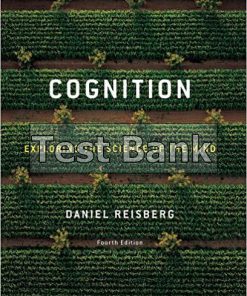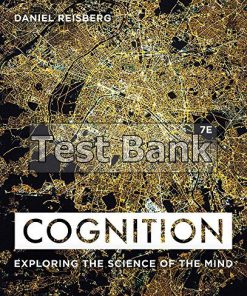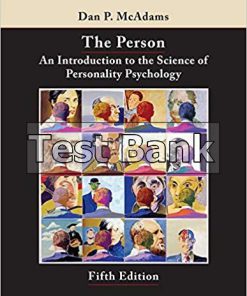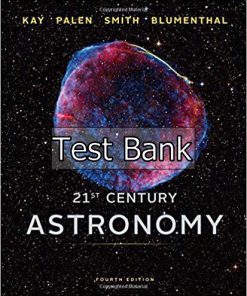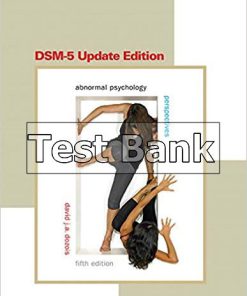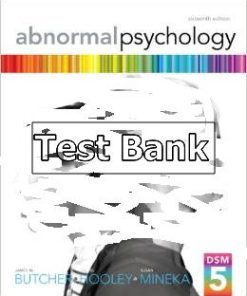Cognitive Science An Introduction to the Study of Mind 3rd Edition Friedenberg Test Bank
$26.50$50.00 (-47%)
Cognitive Science An Introduction to the Study of Mind 3rd Edition Friedenberg Test Bank.
You may also like
Cognitive Science An Introduction to the Study of Mind 3rd Edition Friedenberg Test Bank
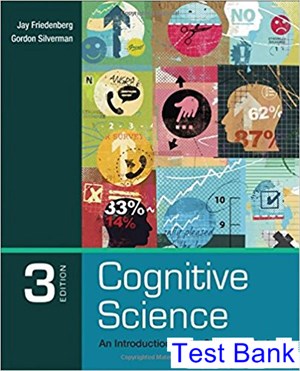
Product details:
- ISBN-10 : 1483347419
- ISBN-13 : 978-1483347417
- Author: Jay Friedenberg
In Cognitive Science 3e Friedenberg and Silverman provide a solid understanding of the major theoretical and empirical contributions of cognitive science. Their text, thoroughly updated for this new third edition, describes the major theories of mind as well as the major experimental results that have emerged within each cognitive science discipline.
Throughout history, different fields of inquiry have attempted to understand the great mystery of mind and answer questions like: What is the mind? How do we see, think, and remember? Can we create machines that are conscious and capable of self-awareness? This books examines these questions and many more. Focusing on the approach of a particular cognitive science field in each chapter, the authors describe its methodology, theoretical perspective, and findings and then offer a critical evaluation of the field.
Table contents:
Chapter 1: Exploring Inner Space
A Brave New World
What Is Cognitive Science?
Representation
Computation
The Interdisciplinary Perspective
Chapter 2: The Philosophical Approach: Enduring Questions
What Is Philosophy?
The Mind-Body Problem-What is Mind?
Monism
Dualism
Functionalism Are Minds Limited to Brains?
The Knowledge Acquisition Problem How Do We Acquire Knowledge?
The Mystery of Consciousness What is Consciousness and How Does it Operate?
Chapter 3: The Psychological Approach: A Profusion of Theories
What Is Psychology?
Psychology and the Scientific Method
Mental Atoms, Mental Molecules, and a Periodic Table of the Mind: The Voluntarist Movement
Structuralism: What the Mind Is
Functionalism: What the Mind Does
The Whole Is Greater Than the Sum of Its Parts: Mental Physics and the Gestalt Movement
Mini-Minds: Mechanism and Psychoanalytic Psychology
Mind as a Black Box: The Behaviorist Approach
Chapter 4: The Cognitive Approach I: Vision, Pattern Recognition, and Attention
Some History First: The Rise of Cognitive Psychology
The Cognitive Approach: Mind as an Information Processor
Modularity of Mind
Theories of Vision and Pattern Recognition
Theories of Attention How do We Pay Attention?
Evaluating the Model-Building Approach
Chapter 5: The Cognitive Approach II: Memory, Imagery, and Problem Solving
Types of Memory How do we Remember?
Memory Models
Visual Imagery How do we Imagine
Problem Solving How do we Solve Problems?
Chapter 6: The Neuroscience Approach: Mind as Brain
The Neuroscience Perspective
Methodology in Neuroscience
The Small Picture: Neuron Anatomy and Physiology
The Big Picture: Brain Anatomy
The Neuroscience of Visual Object Recognition
The Neuroscience of Attention
The Neuroscience of Memory
Neural Substrates of Working Memory
The Neuroscience of Executive Function and Problem Solving
Chapter 7: The Network Approach: Mind as a Web
The Network Perspective
Artificial Neural Networks
Characteristics of Artificial Neural Networks
Early Conceptions of Neural Networks
Back Propagation and Convergent Dynamics
Evaluating the Connectionist Approach
Semantic Networks: Meaning in the Web
Network Science
Chapter 8: The Evolutionary Approach: Change Over Time
The Evolutionary View
A Little Background: Natural Selection and Genetics
Comparative Cognition
Evolutionary Psychology
Evaluating Evolutionary Psychology
Chapter 9: The Linguistic Approach: Language and Cognitive Science
The Linguistic Approach: The Importance of Language
The Nature of Language
Language Use in Primates
Language Acquisition
Language Deprivation
Cognition and Linguistics: The Role of Grammar
Neuroscience and Linguistics: The Wernicke-Geschwind Model
Artificial Intelligence and Linguistics: Natural Language Processing
Chapter 10: The Emotional Approach: Mind as Emotion
What Is Emotion?
Theories of Emotion
Basic Emotions
Emotions, Evolution, and Psychological Disorders
Emotions and Neuroscience
Hot and Cold: Emotion-Cognition Interactions
Emotions and Artificial Intelligence: Affective Computing
Chapter 11: The Social Approach: Mind as Society
Social Cognition
Social Cognitive Neuroscience
Topics in Social Cognitive Neuroscience
Is Social Cognitive Neuroscience Special?
Advantages of the Social Cognitive Neuroscience Approach
Theory of Mind
Other Social Cognitive Disorders
Attitudes
Impressions
Attribution
Stereotypes
Prejudice
Chapter 12: The Artificial Intelligence Approach I: Mind as Machine
Cognitive Science and Artificial Intelligence
Historical Precursors
Defining AI
Doctrinal Arguments
Turing Critical Legacy
Practical AI
Fuzzy Thinking the legacy of Lotfi Zadeh
The Contentious Debate and AI Evolution
The Neural Net Model and its Capabilities
The New Millennium: Cognitive Computing
(Is it possible to build a brain?)
Chapter 13: The Artificial Intelligence Approach II: Embodiments and Robotics
The Intelligent Agent Paradigm
Emerging Developments
Chapter 14: Conclusion: Where We Go From Here
The Benefits of Cognitive Science
Issues in Cognitive Science
The Dynamical Systems Approach
Dynamical Representation
Dynamical Versus Classical Cognitive Science
Evaluating the Dynamical Perspective
Integrating Cognitive Science
The Future
People also search:
cognitive science an introduction to the science of the mind
mind introduction to cognitive science pdf
cognitive science an introduction to the study of mind
cognitive science an introduction to the study of mind pdf




